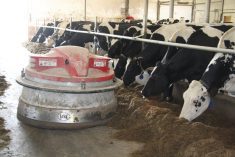RED DEER – Using a pressure washer without disinfectant to clean a hog barn may do more harm than good.
“What we have found is washing alone without using disinfectant increases the number of positive swabs,” swine veterinarian Egan Brockhoff told the recent swine technology workshop in Red Deer.
“Pressure washing increases the spray and aerosolization of bacteria or viruses and redistributes them throughout the room on water droplets,” said the veterinarian with Prairie Swine Health Services in Red Deer and the University of Calgary faculty of veterinary medicine.
Read Also

Manitoba extends Crown land rent freeze
Manitoba government links the continued rental rate freeze on grazing and forage leases to economic and environmental challenges facing the industry
Bacterial scours are often linked to poor farrowing room hygiene.
“You come into the farrowing room and you can’t see piglets for the manure everywhere and there is biofilm on everything,” he said.
Biofilm is like plaque on teeth or sludge in a water line and is a source of contamination that can be reduced with detergents and disinfectant.
All available commercial disinfectants work well when used according to label instructions. The concentration needs to be correct, but most farms use less than half of the label recommendations.
“We probably don’t do a spectacular job of washing,” Brockhoff said.
Good sanitation can reduce the presence of germs because disease severity depends on the amount and virulence of the pathogen.
“You can have a high dose of a nonvirulent pathogen and not have a lot of disease but lots of times we have high virulence, very angry, very adaptable bacteria, viruses or parasites that come in and cause a lot of trouble,” he said.
Research has found that relatively small amounts of bacteria are spread in trucks, pens and water bowls. The greater culprits are boots and brooms.
Piglets born into a pile of manure behind the sow are set up for disease. Daily cleaning of the farrowing crate before and during the birthing process helps reduce disease risk.
Four to five salmonella bacteria can cause disease so washing sows’ udders could be helpful.
Newborns must also receive enough colostrum, which is loaded with antibodies. Receiving adequate colostrum early on affects long-term health.
“The more you can get into them in the first six hours versus 12 or 24 hours is best,” Brockhoff said.
It also works best if piglets receive colostrum from their own mothers. It enters the small intestine, where it is absorbed into the bloodstream.
Bacteria can still get through piglets’ intestinal system and cause disease if they live in an extremely dirty environment.
Cold barns increase disease susceptibility.
“It doesn’t matter how much colostrum the little guys got if you freeze them to death,” he said.















